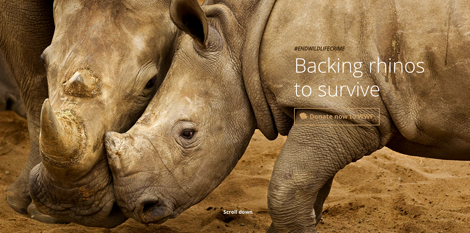Modern methods lead the way toward a rhino rebound

Cutting-edge technology and techniques have become essential tools in the effort to save rhinos. Micro chips, translocation and consumer campaigns are helping shift the balance against record-setting poaching threatening the world's remaining rhinos.
As World Wildlife Day is commemorated, WWF continues to be serious against wildlife crime, assisting in efforts to counter poachers and the international criminal networks that back them.
"Rhino poaching is a complex challenge, we need a range of different tools to stop it," explains Jo Shaw, WWF-South Africa rhino programme manager.
In Kenya, WWF works with the Kenya Wildlife Service to microchip black rhinos. Chips are hidden in rhino horns and allow researchers to individually identify and monitor endangered rhinos. When poachers do strike, those tiny bits of technology provide evidence of crimes committed by everyone in the trafficking chain.
WWF also translocates critically endangered black rhinos, trucking and airlifting them from parks to new reserves around South Africa. Since 2003, over 140 have been relocated and 70 calves have already been born to nine founder populations.
Extra land and enhanced anti-poaching efforts alone cannot win the war against rhino poaching. In many parts of Asia, demand for rhino horn is growing – either as a status symbol or for its perceived health benefits. Until this demand dries up, rhinos will remain at risk.
WWF and TRAFFIC, our wildlife trade specialist partner, are using innovative approaches to change consumer behaviour and break the rhino horn market. The Chi ('Strength of Will') campaign in Viet Nam shows influential men that they don't need rhino horn to bolster self-esteem or demonstrate business success.

WWF is also working on the diplomatic front and will attend a global meeting on illegal wildlife trade in Botswana later this month to bolster efforts against wildlife crime.
Only by targeting every link in the trade chain can rhinos be saved. While the odds may seem daunting, the rhino has already been saved from extinction in the past. Recent success stories, including zero poaching in Nepal, show that rhinos can be saved again.
Provided by WWF




















